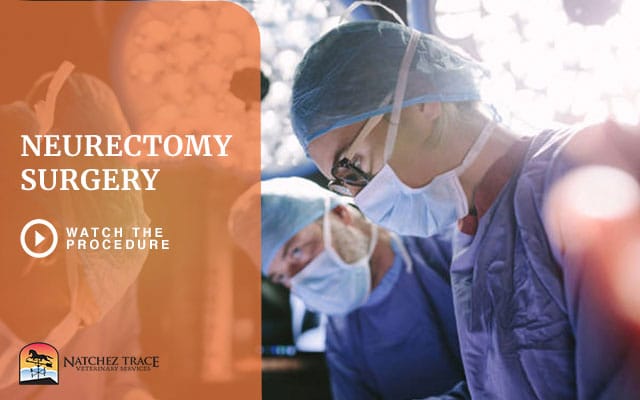What is Neurectomy Surgery?
Neurectomy surgery is one of the treatments for navicular disease. Navicular disease is a degenerative disease of a horse’s heel.
Other names for neurectomy are:
- Nerving
- Palmer digital neurectomy
- Posterior digital neurectomy.
It is a surgical procedure where the surgeon cuts or removes a portion of the nerve supply to the horse’s foot.
Oftentimes, we use neurectomy surgery as a last resort for relieving heel pain.
Watch Surgical Horse Neurectomy on Youtube.
Will a Neurectomy Help My Horse?
Maybe. Experience shows neurectomy is often more successful in younger horses.
Most importantly, you need to understand the potential complications of the surgery.
What is important is that you, as the owner, understand the potential complications of the surgery.
Complications include:
- Painful neuroma formations
- Undetected sub-solar infection
- Abscesses
- Puncture wounds from numbed feet
- Breakdown of the deep digital flexor tendon (DDFT).
Just like with any procedure, you should discuss your expectations and your horse’s needs with your veterinarian.
Your vet will help you make the best decision.
Prognosis After Neurectomy Surgery
The success rate of a neurectomy varies. Roughly 20% of horses do not respond to the surgery.
The reason is because some small ancillary nerve fibers may not be removed.
In addition, after the horse has been nerved, various complications may occur.
Potential surgical complications include:
- Failed surgery
- Infection
- Formation of painful neuromas.
Unfortunately, the surgery does not correct navicular disease. But, it does remove the pain.
Most horses get 1-4 years of pain relief. But, neurectomy is not considered a permanent fix because the nerves can grow back.
However, seven out of ten horses will return to athletic function after surgery.
Caring for Your Horse After Neurectomy Surgery
After surgery, your horse should be able to go back to work in roughly four weeks.
You will need to pay extra attention to your horse’s feet and check them daily.
In addition, keep in mind your horse’s feet will be numb and prone to injury.
Also, is important to follow up with your veterinarian to make sure your horse is healing correctly.








